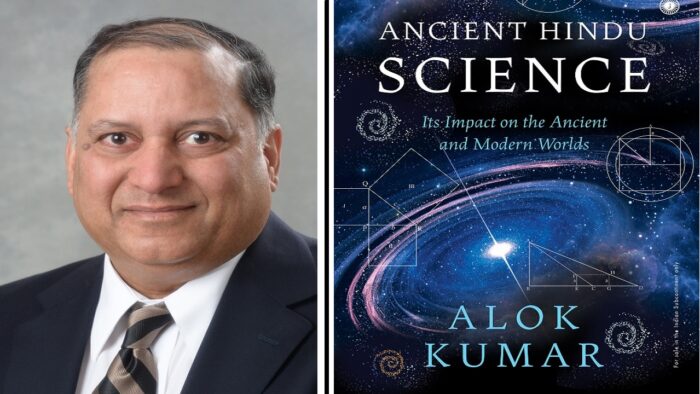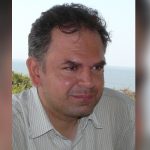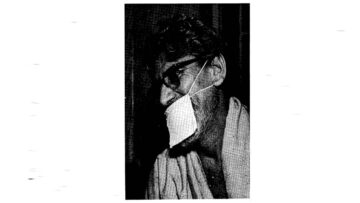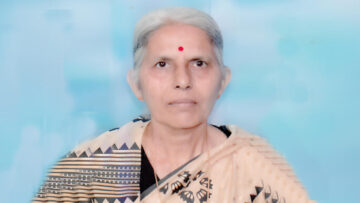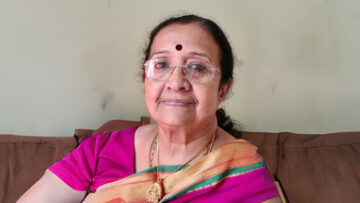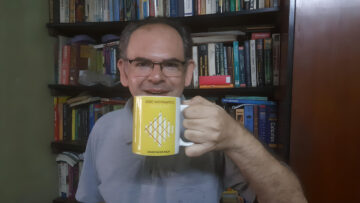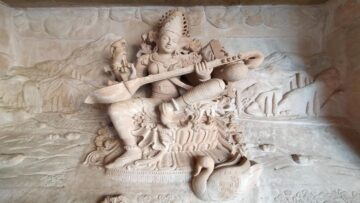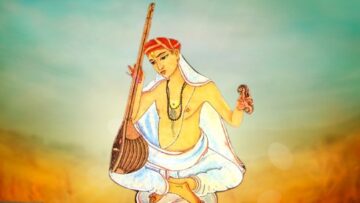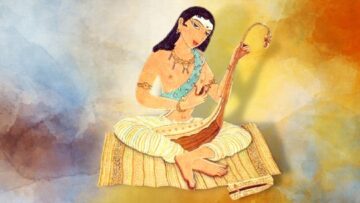We Indians proudly state that ancient and medieval India was a scientifically advanced civilization. But, very few people know about the exact contributions of India to the world of science and technology. Many people in their ignorance make tall or misleading claims and this does a big disservice to the subject.
To address this issue Prof. Alok Kumar has written a well researched book “Ancient Hindu Science” with exhaustive information on the subject, which is backed by credible references.
We recently conducted an interview with Prof. Alok Kumar wherein he talks about the various research methodologies and his entire journey during this process that finally culminated in the form of this amazing book.
Question: How did the journey begin? How or what got you interested in the subject?
I credit most of my achievements to my upbringing in the holy city Haridwar, a city known for the Ganges River, and my parents. I was told by my parents that the Hindu culture has a long and glorified intellectual tradition. The lofty heights reached by the ancient Hindus in the realm of philosophy and religion are established and extensive literature exists on these topics. I was also aware of India’s materialistic prosperity as it was popularly known as “golden bird” (sone ke Chidiya). However, not much was known to me about India’s contributions to natural sciences.
I knew that all cultures have found intellectual satisfaction and material benefits from their attempts to understand physical and biological phenomena. This means that excelling in science leads to materialistic prosperity. How India could become rich without doing much in science and technology?
My educational system simply failed me in teaching about my own roots, traditions, and culture. I still feel bitter about it. My science courses in India taught me about Democritus, Archimedes, and Newton, to name a few, and nothing about Kanada, Aryabhata, Varahamihir, and Brahmagupta.
After earning a Ph.D. degree in physics, I found a job in California State University, Long Beach, in America. My parents did not want me to leave India. After they recognized my intense wish to join the university, they relented and assisted me to leave the country. However, they asked me to find ways to contribute something for India and the Hindu religion. I promised and this is how my journey to explore my own cultural heritage in science slowly started.
Question: Your experiences (good or not so good) while pursuing your interest?
I tried to find an introductory book on ancient Hindu science to learn about my own heritage. It was not an easy task. As a researcher, I always treat an obstacle as an opportunity. The more I struggled in my searches to learn about Hindu science, the more I became interested in this subject.
At Long Beach, as a young researcher and teacher, I had to get established to secure my job. I succeeded in teaching physics from the very first semester and was liked by my students. I also found excellent collaborators to pursue researches in atomic physics. However, in most physics program, researches in the history of science are not favorably looked upon. As a result, I avoided sharing my researches on Hindu science and was even reluctant to publish a research paper on this topic during my early career.
I thought if Hindus had a prime past, other cultures must have recognized the fact and must have written something about it. Therefore, I decided to read the primary literature of India and the Indian accounts from the Greek, Chinese, European, and the Middle Eastern sources. This study was an eye opener. It was a slow and painstaking process since the digital records did not even exist at that time. When I compiled the scientific achievements of the Hindus from the accounts of Aristotle, Arrian, Megasthenes, and Pythagoras among the Greeks; Al-Biruni, Al-Khwarizmi, Ibn Labban, al-Fazari, al-Masudi, and Al-Uqlidisi among the Islamic scholars; Fa-Hien (Faxian), Hiuen Tsang (Xuanzang), and I-tsing (Yijing) among the Chinese; Leonardo Fibonacci, Pope Sylvester II, Roger Bacon, Voltaire and Copernicus from Europe, an interesting mosaic emerged. With further research, I recognized that, in the modern era, thinkers and scientists as diverse as Goethe, Emerson, Thoreau, Jung, Oppenheimer, Herder, and Schrodinger, to name a few, have acknowledged their debt to ancient Hindu achievements in science, technology, and philosophy. I decided to compile a history of the Hindus based on these accounts. The mosaic that emerged from this effort was in contrast to what is generally portrayed in the popular media and even in academics. This is the story behind my book, Ancient Hindu Science.
I struggled with my choices of pursuing two diverse research interests: atomic physics and ancient Hindu science. My work on Hindu science was not accepted or recognized in academia. This created a dilemma often in my mind. This is where my father helped me often. He always told me to follow my own dreams, work hard, and do not be obsessed with worldly success. As a result, I continued with my researches on Hindu science. Today, I can safely say that I achieved well in terms of worldly and personal successes. I did not sacrifice much. I am a Distinguished Teaching Professor at the State University of New York. This top rank is bestowed to less than five percent professors.
Question: Your experiences (good or not so good) while writing the book?
While going through the primary literature, I learned a lot of new information that are not listed in the popular literature. I noticed that several established European scholars considered India as the leader in science and technology. This is something that I never heard before and decided to write about it. This is how my first book, Science in the Medieval World, was written. It is based on an eleventh-century document from the Muslim Spain. This document, originally written by Said al-Andalusi, ranks Hind (India) at the top in sciences in comparison to all other nations, including Greece, Europe, the Middle East, and Egypt. The book became successful and this provided me a big boost. Suddenly criticisms on my scholarships on Hindu science subsided.
As a result, not only the above-mentioned book, I ended up writing three more books and several more are yet to be published.
Sharing my projects with my colleagues and fellow Indians was not a pleasant experience at times. They labeled my efforts as ‘saffronization’ of academia. However, in my mind, I only wanted to know the truth.
Question: Your purpose/goal behind writing this book?
I did not have any special agenda. I only wanted to know my own truthful cultural heritage and share it with all in the form of a book. Unfortunately, the pseudo-secular environment in India today creates a dilemma when some people label studies of ancient sciences as “saffronization.” In my view, people in India should raise this question: Is it true? If yes, we must include sciences of the ancient Hindus in academia to train the future generations of India to know about their heritage. It is done in the Western education too; it is done in most cultures. China, Russia, America and many other countries have done that. India is an exception in this respect that we do not share our own heritage with our citizens. However, with recent changes in the mindset of Indians, I am hopeful that Indian academia will change.
Question: Why should we know history?
The history of science is not just the history of events; it is the history of culture, people’s intents, and a history of human minds. Our studies of history tell us how various cultures in the past recognized issues that they found crucial and resolved them. History tells us what to be ignored, what to be embraced, and what to be discarded. Such knowledge is important in dealing with the unknown future we deal with on an ongoing basis. Otherwise, we will keep inventing the wheel again and again. Knowing what we were in the past helps us to understand what we are in the present, and who we will be in the future.
History plays a similar role to a culture as memory plays to a person. Our memory keeps a record of our reflections and dreams that allows us to function in our day-to-day activities. In the absence of memory, we need to reinvent the wheel again and again, as the phrase goes. Same is true for a culture. We need guidelines in dealing with situations based on past experiences.
Just imagine erasing the name of Pythagoras, Aristotle, and Plato from the current philosophy texts because it is an old past and, therefore, irrelevant. Think of a physics book without Newton, Faraday, or Archimedes. Will it be just and fair? The answer is a clear and emphatic “no”. This is exactly the case when we ignore our own heroes in India unjustly. Aryabhata, Kanada, Nagarajuna, Varahamihir, and Brahmagupta should be mentioned in our introductory science textbooks. Celebration and recognition of our heroes in all disciplines serves as glue for a stable society. For this reason, most societies document their own histories.
Question: What according to you is the most amazing thing in Indian Sciences?
It is difficult for me to share one particular moment or thing. I have gone through plenty of these “wow” moments over the years. I still go through such moments on a regular basis. For example, the invention of zero and infinity from the religious philosophy is so mesmerizing (neti-neti and defining attributes of God). Aryabhata’s consideration of the motion of earth during the fifth century is still astonishing when I think about it. Thinking about the beauty of the oral tradition of the Hindus is still mesmerizes me. Using debates (shastrarth) to resolve intellectual and personal matters is mark of highly civilized society. No Bruno or Galileo ever suffered in India for his/her ideas.
Modern science and medicine would be unrecognizable, and far more primitive, without the immense contribution of the ancient Hindus. They invented everyday essentials such as our base-ten number system, with place-value notations, and zero as a numeral. The ancient Hindus also developed a sophisticated system of medicine with its mind-body approach known as Ayurveda; detailed anatomical and surgical knowledge of the human body, including cataract surgery and the so-called plastic surgery; metallurgical methods of extraction and purification of metals, including the so-called Damascus blade; knowledge of various constellations and planetary motions that was good enough to assign motion to the Earth; and the science of self-improvement popularly known as yoga.
Just imagine the modern world without the mathematical revolution of the ancient Hindus. The scientific revolution during the European Renaissance was a result of this mathematical revolution that originated in India. Copernicus discarded the Roman numeral system and used the Hindu place-value system in writing his book, De revolutionibus orbium coelestium (On the Revolutions of the Celestial Spheres). The Hindu system is so advanced and, yet, so simple that children are taught to write eleven as one and one (11), written side-by-side, from their earliest period when they also learn their native alphabet.
Learning about the so-called plastic surgery in Susruta Samhita is another wow moment to me. Visiting New Delhi and touching the rust-free Iron Pillar near Qutub Minar as a child was also a somewhat supernatural experience.
Question: What should be done to create awareness and promote interest in Indian sciences amongst the general public?
As it was done in China, Russia, the United Kingdom and the United States of America, we need to attract the best brains in India to this task. This can be easily achieved with some financial support from the Indian government. Indian government should find a person similar toJoseph Needham to explore the Indian heritage and support that person like the Chinese government did. We need to translate a large number of Sanskrit manuscripts into English. Courses must be offered in academia on the history of India.
Hindu literature is massive. I have worked in this field for over 4 decades and still I am not able to read many manuscripts. This situation becomes even more troublesome when scholars cannot even access these manuscripts. Most of these manuscripts/books are outside the domain of copyright system. Yet, there is no repository of these books in digital form that can be accessed and analyzed on the Internet. This situation must change.
My book is only the tip of the iceberg, as the phrase goes. There is a lot more efforts needed in India to explore our heritage and disseminate the knowledge with general public. This can only be achieved if people with varied backgrounds can join this endeavor.
Question: What is your advice for the students pursuing research in Indian sciences?
It is not in my nature to give advices, especially to people I do not know. I can only wish that these students enjoy the journey as much as I have enjoyed it. In place of advice, let me share some needs.
A large number of manuscripts are still in Sanskrit and not digitized. These manuscripts need to be translated into English so that the global community can access and analyze them. We need to digitize archaeological sites in India so that the world community can appreciate knowing them. Similarly, a large number of Arabic manuscripts are still to be translated. Some of these manuscripts are related to India and such translations will only bring glory to India. As known to most scholars in the field, scholars in the Middle East were appreciative of Hindu scholars and shared their thoughts on India in glorious terms.
Question: What is your next project / book?
As a professor in physics, I am always involved in multiple projects simultaneously. Let me mention one project that is quite dear to me. The scientific exchanges between India and the Middle East happened even before the beginning of Islam. During the Golden Period of Islam, these exchanges became quite intense. Yet, in contrast to Greek encounters with other cultures, exchanges between India and the Middle East have not received adequate attention of scholars. There are not many scholarly books on this subject. I plan to publish a book on this subject in near future.
Disclaimer: The opinions expressed in this article belong to the author. Indic Today is neither responsible nor liable for the accuracy, completeness, suitability, or validity of any information in the article.

